History > QUESTIONS & ANSWERS > Georgia History Exemption Exam Questions and Answers Graded A+ (All)
Georgia History Exemption Exam Questions and Answers Graded A+
Document Content and Description Below
Georgia History Exemption Exam Questions and Answers Graded A+ Fall Line -✔✔ - the point on a river where there is an abrupt drop in elevation of the land and where numerous waterfalls occur. ... - it is the ancient coastline of the southern tier of North America when sea-levels wer higher - Navigation up-stream beyond this feature stops - ultimately towns located just beyond this natural boundary were important river ports (like Macon) - The line in the eastern US is located where streams pass from harder to softer rocks.[E - M.Y.] Georgia capitals -✔✔ Savannah, Augusta, Louisville, Milledgeville, Atlanta Atlanta -✔✔ - Largest city in Georgia and the Deep South - Capital of modern Georgia - originally named Terminus, as it became the South's most important rail hub and manufacturing center; - set ablaze by General Sherman James Wright -✔✔ Georgia's 3rd (and last) Royal Governor. He was extremely popular and successful Indigo, Silk -✔✔ - Brought to GA by Europeans - became a new major cash crop Hernando de Soto -✔✔ Spanish explorer and conquistador who led the first European expedition deep into the modern-day Southeastern United States (Florida, Georgia, Alabama and most likely Arkansas) in 1540, and the first documented European to have crossed the Mississippi River. Salzburgers -✔✔ Some of the first immigrants to the new Georgia colony in the 1730's From Austria came to Georgia to escape religious persecution (they were protestants, not Catholics) settled Ebenezer/New Ebenezer opposed slavery James Oglethorpe -✔✔ Founder of Savannah (1733), and governor of the Georgia colony. He ran a tightly-disciplined, military-like colony. Slaves, alcohol, and Catholicism were forbidden in his colony. Many colonists felt that he was a dictator, and that (along with the colonist's dissatisfaction over not being allowed to own slaves) caused the colony to break down and he to lose his position as governor. Georgia Trustees -✔✔ They gave out land between the Savannah and Altamaha Rivers. They also prohibited having rum and owning African Slaves. Scottish Highlanders -✔✔ - Added protection to GAs southern border - fought with Oglethorpe to fight off the Spanish Fletcher v. Peck -✔✔ (1810) First time the Supreme Court ruled a state law unconstitutional. It protected property rights and allowed the invalidation of state laws that conflicted with the Constitution. Worcester v. Georgia -✔✔ (1832) US Supreme Court (esp. Frank Marshall) held that Cherokee Native Americans were entitled to federal protection from the actions of state governments which would infringe on the tribe's sovereignty. Ignored blatantly by Andrew Jackson Battle of Bloody Marsh -✔✔ In 1742, Oglethorpe's forces, along with help from the Highland Scots, surprised Spanish troops at St. Simon's Is;and and forced them back across the Florida border. This marked the beginning of a safe southern frontier for the British. Battle of Kettle Creek -✔✔ First colonial victory in Georgia on Feb. 14, 1779; important to Georgia because it increased morale and the militia was able to take horses and much needed weapons from the British Yazoo Land Fraud -✔✔ This scandal that took place in Georgia in the early 1800's & resulted in Georgia losing much land in what is now Alabama and Mississippi - Also made the western border of Georgia the Chattahoochee River? James Vann -✔✔ In 1800, while on an East Coast trip that included a visit to Washington, D.C., Vann met a group of Moravian missionaries from North Carolina who desired to spread the Gospel and teach Cherokee children. Vann convinced them to move to Spring Place, south of the soon-to-be-built Vann House, to start a mission and school. He presented his idea to the tribal council, in part so his two-year old son Joseph might attend. That autumn the Moravians would have a school. Many of the mixed-blood Cherokee supported Vann. The council vote was in favor of the Moravians. Joseph Vann -✔✔ Cherokee plantation owner, son of Chief James Vann, who had his land confiscated because he hired a white man to work for him Siege of Savannah -✔✔ American Revolution battle in GA; loss for Georgia as the militia and continental army failed to retake GA's capital city from British control Cherokee Nation v. Georgia -✔✔ (1831) Established that Indian tribes are a "domestic dependent nation" under the care of the U.S. Government and therefore not a foreign nation with the right to sue in federal court Treaty of Indian Springs -✔✔ A treaty signed in 1825 by which the Lower Creek gave up all their land east of the Oconee war - where the creek Indians burned houses, stole cattle, and more - for $200,000 Sequoyah -✔✔ Cherokee leader who developed the alphabet for the Cherokee language. Eugene Talmadge -✔✔ GA Governor during the Great Depression; served 2 terms. Was popular among rural farmers, county unit system helped get him elected. Was a white supremacist, tried to fire those who supported integration of schools. Was against the New Deal; his opposition to it hurt rural farmers. Three Governors Controversy -✔✔ - Eugene Talmadge had served two terms as governor and could not run again. - Ellis Arnall was elected and served only one term - Eugene ran, again, against him and won, but died before he was inaugurated. - Newly elected Lt. governor Melvin Thompson believed he was to be governor since the new state constitution stated the Lt. governor was to take over if the governor could not - Herman Talmadge (Eugene's son) was placed in office by the General Assembly. - Ellis Arnall refused to leave office until the matter was settled. - State supreme court stated General Assembly's action was unconstitutional, and Thompson was placed in office until a special election was held. - Herman Talmadge won the special election Robert Toombs -✔✔ -A senator and extremist from Georgia who said that the South would never let the federal government be controlled by the Republican party; lead the fight for secession against Stephens; Whig party; a founding father of the Confederacy. Writer of confederate constitution. Georgia Gold Rush -✔✔ The discovery of gold near the Georgia city Dahlonega led to the forced removal of the Cherokee Indians (known as the Trail of Tears) Trail of Tears -✔✔ In 1838 and 1839, as part of Andrew Jackson's Indian removal policy, the Cherokee nation was forced to give up its lands east of the Mississippi River and to migrate to an area in present-day Oklahoma. Devastating effects, More than 4,000 perished [Show More]
Last updated: 2 years ago
Preview 1 out of 9 pages
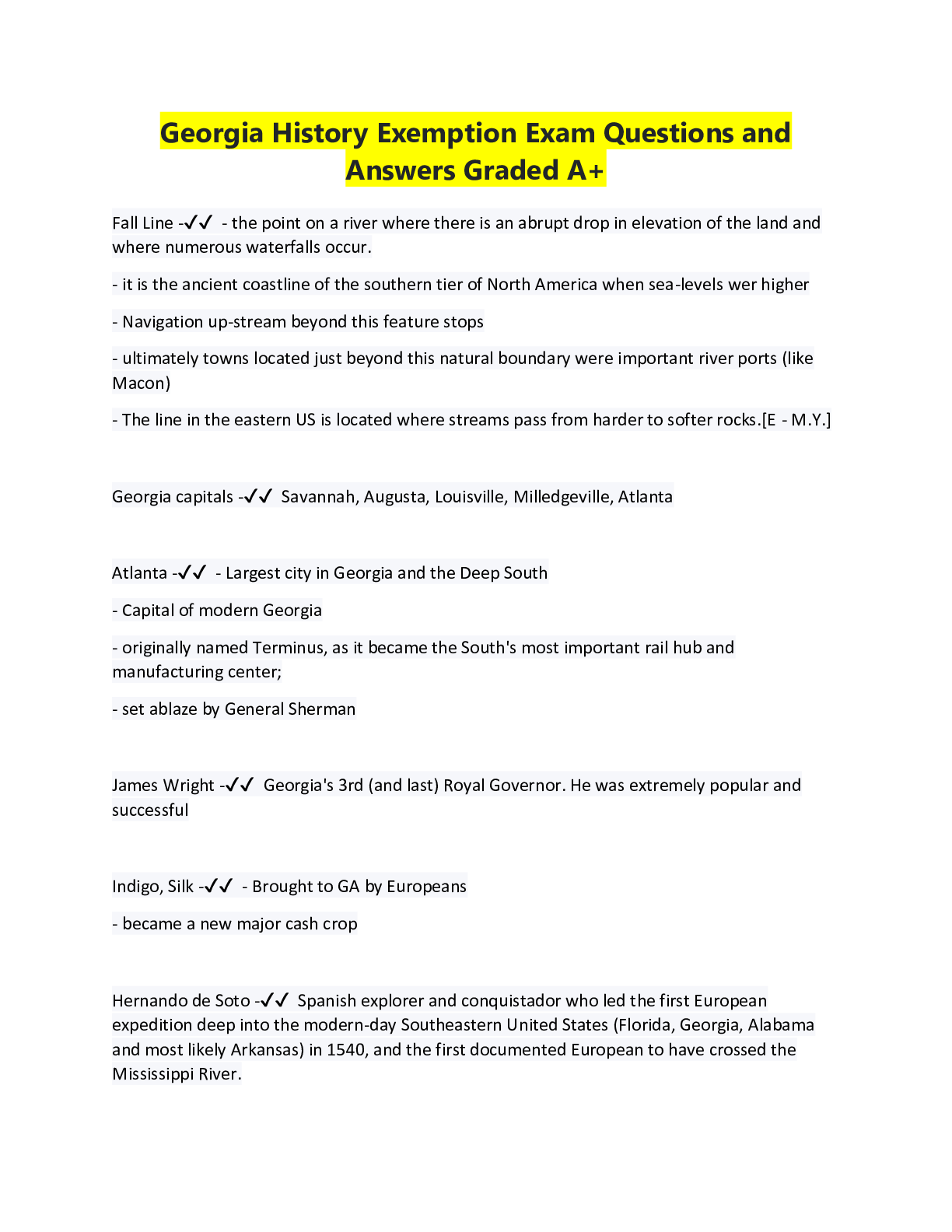
Buy this document to get the full access instantly
Instant Download Access after purchase
Buy NowInstant download
We Accept:

Reviews( 0 )
$9.00
Can't find what you want? Try our AI powered Search
Document information
Connected school, study & course
About the document
Uploaded On
Mar 05, 2023
Number of pages
9
Written in
Additional information
This document has been written for:
Uploaded
Mar 05, 2023
Downloads
0
Views
87
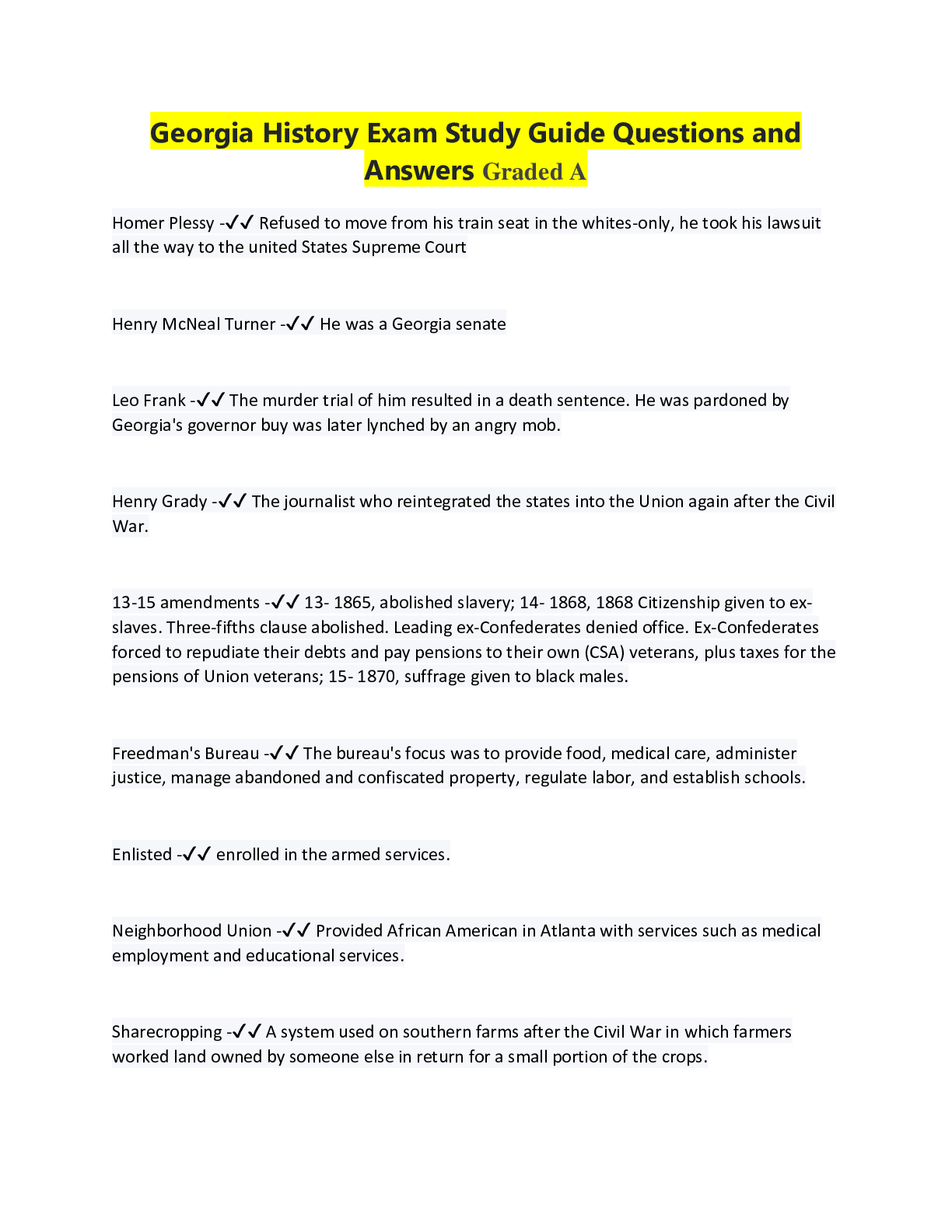


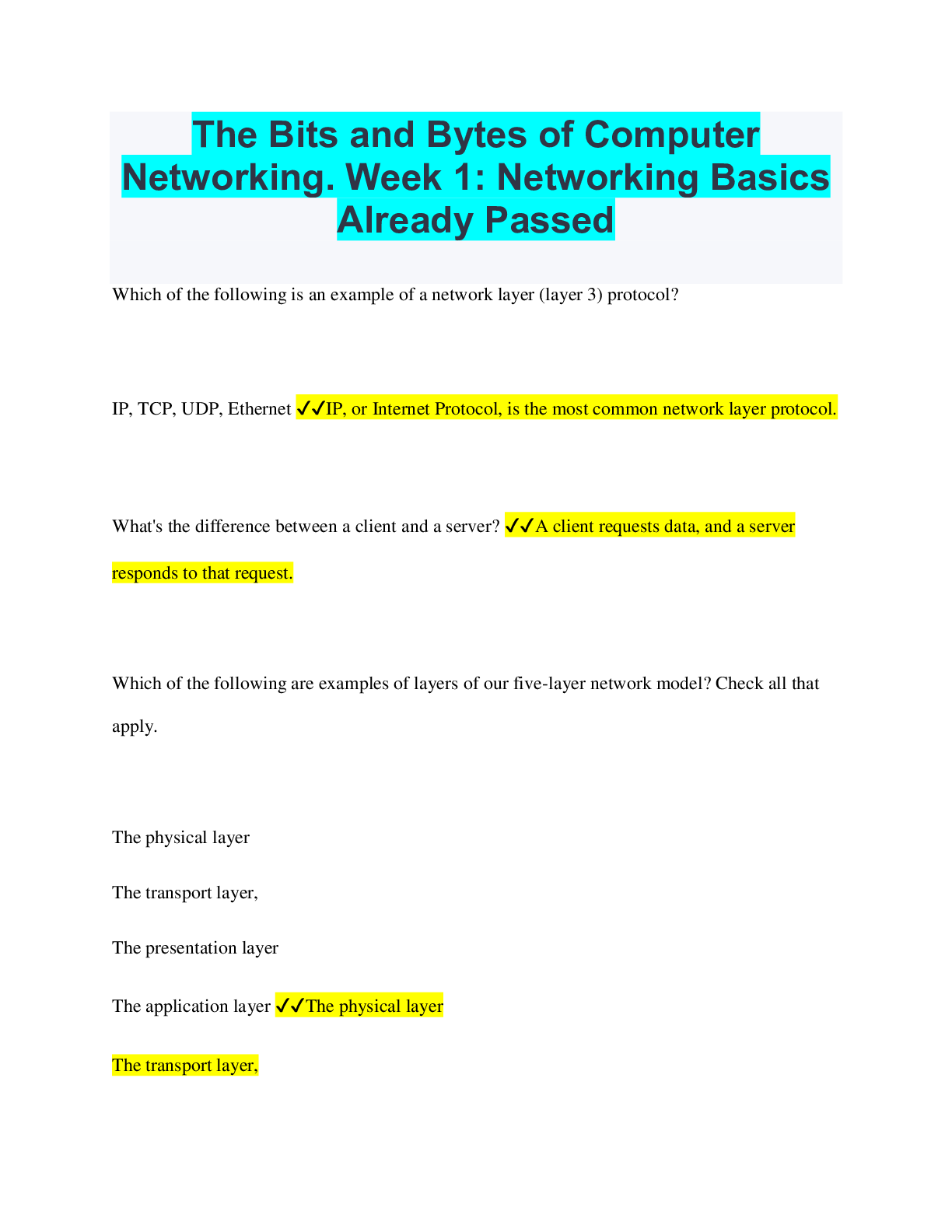
 Answered 2023.png)


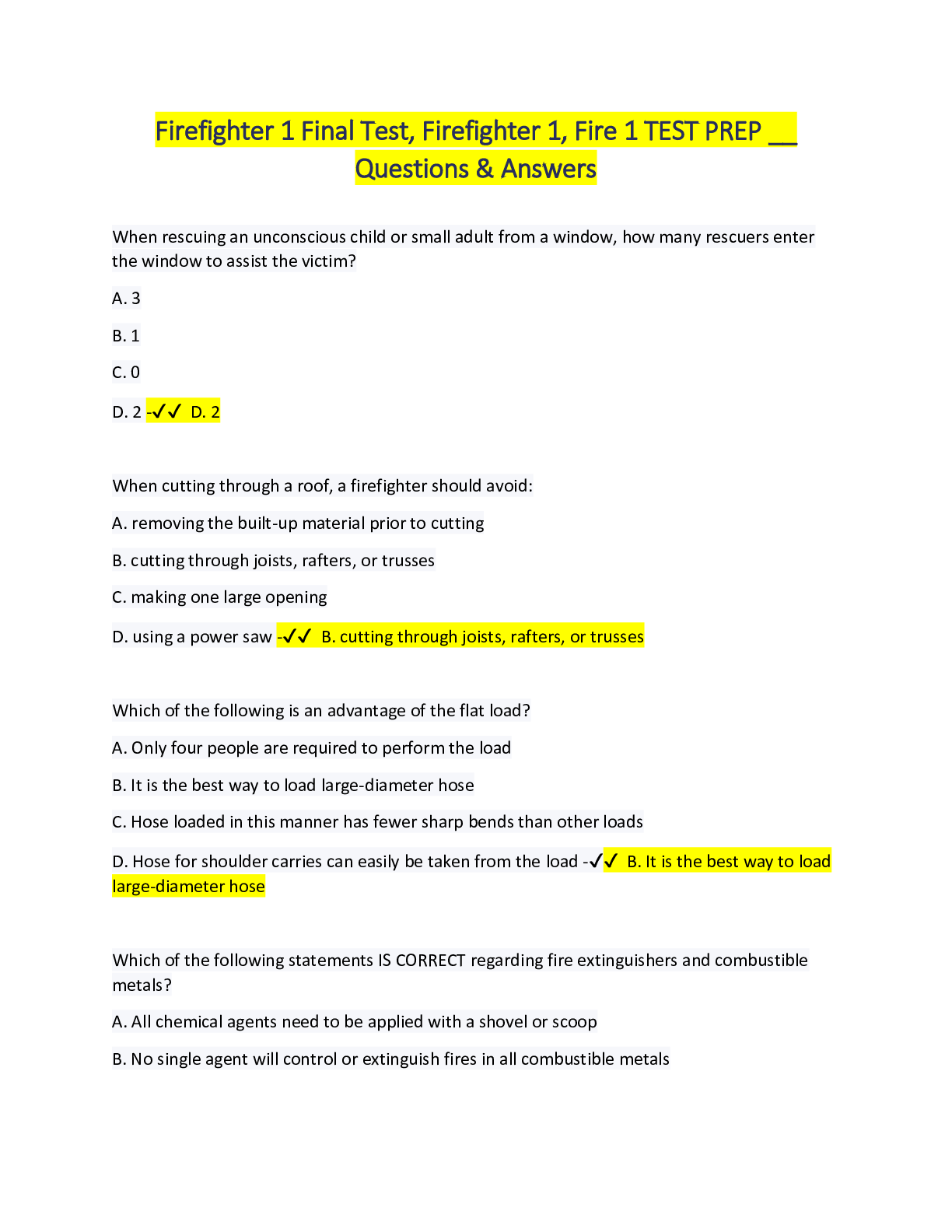
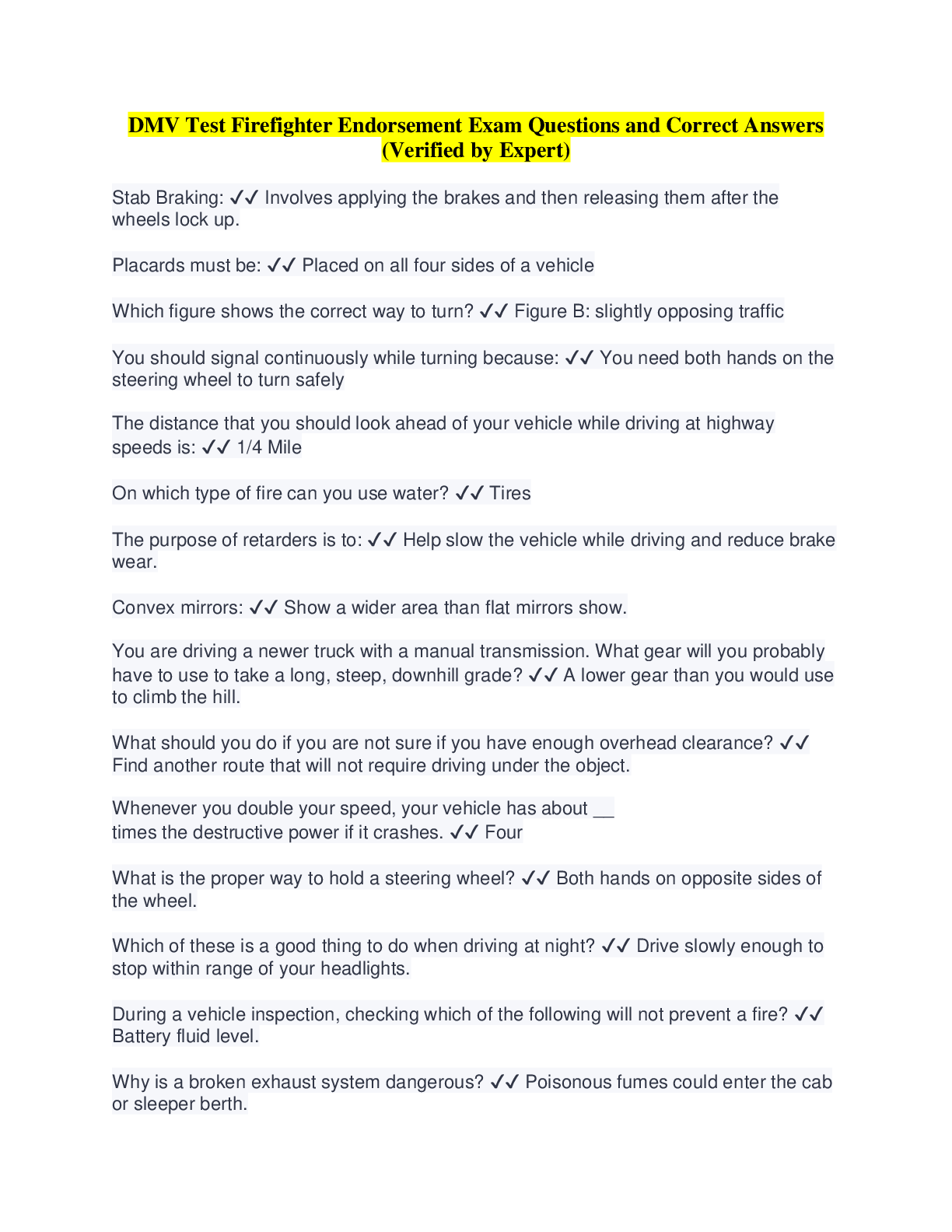







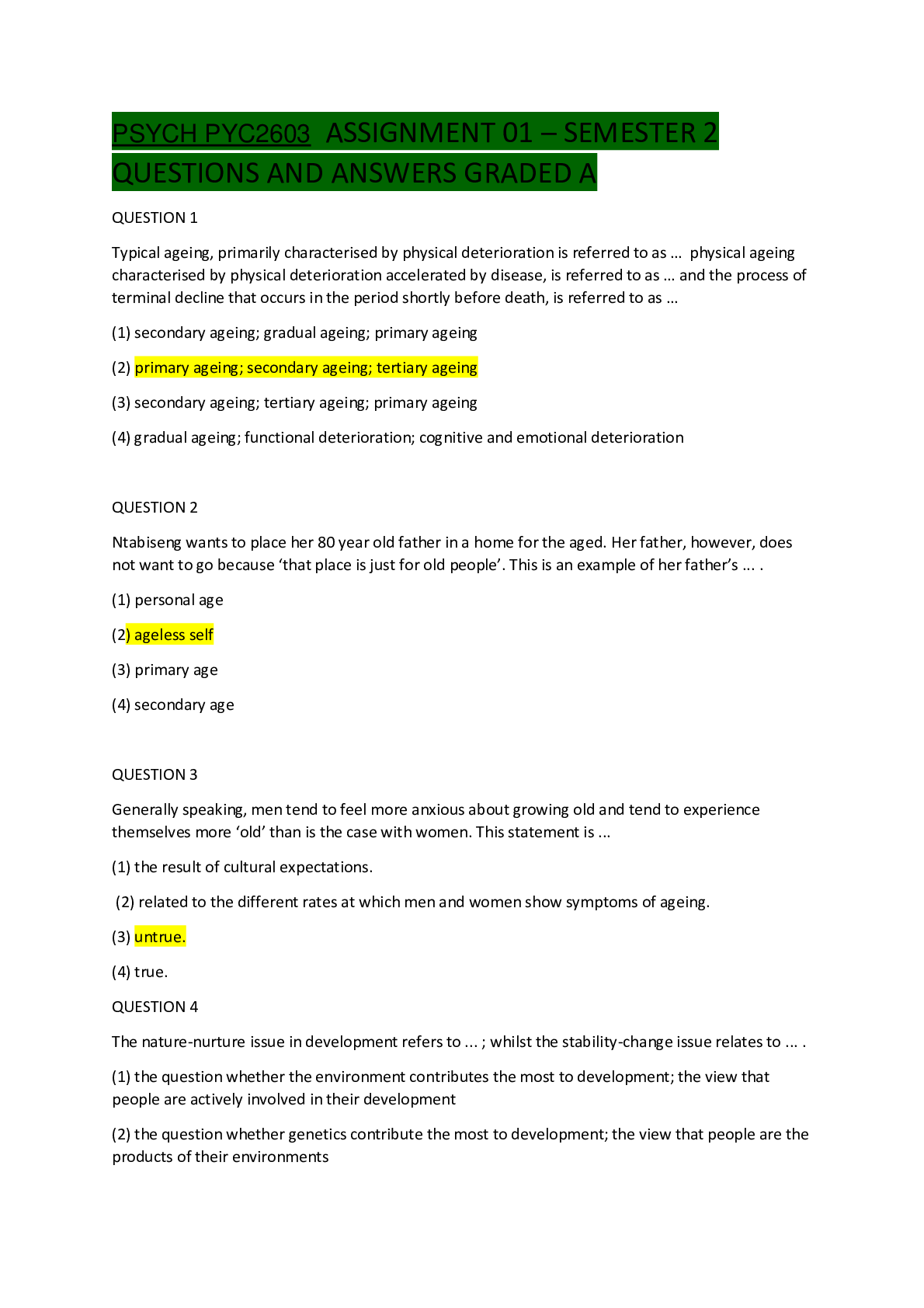



.png)

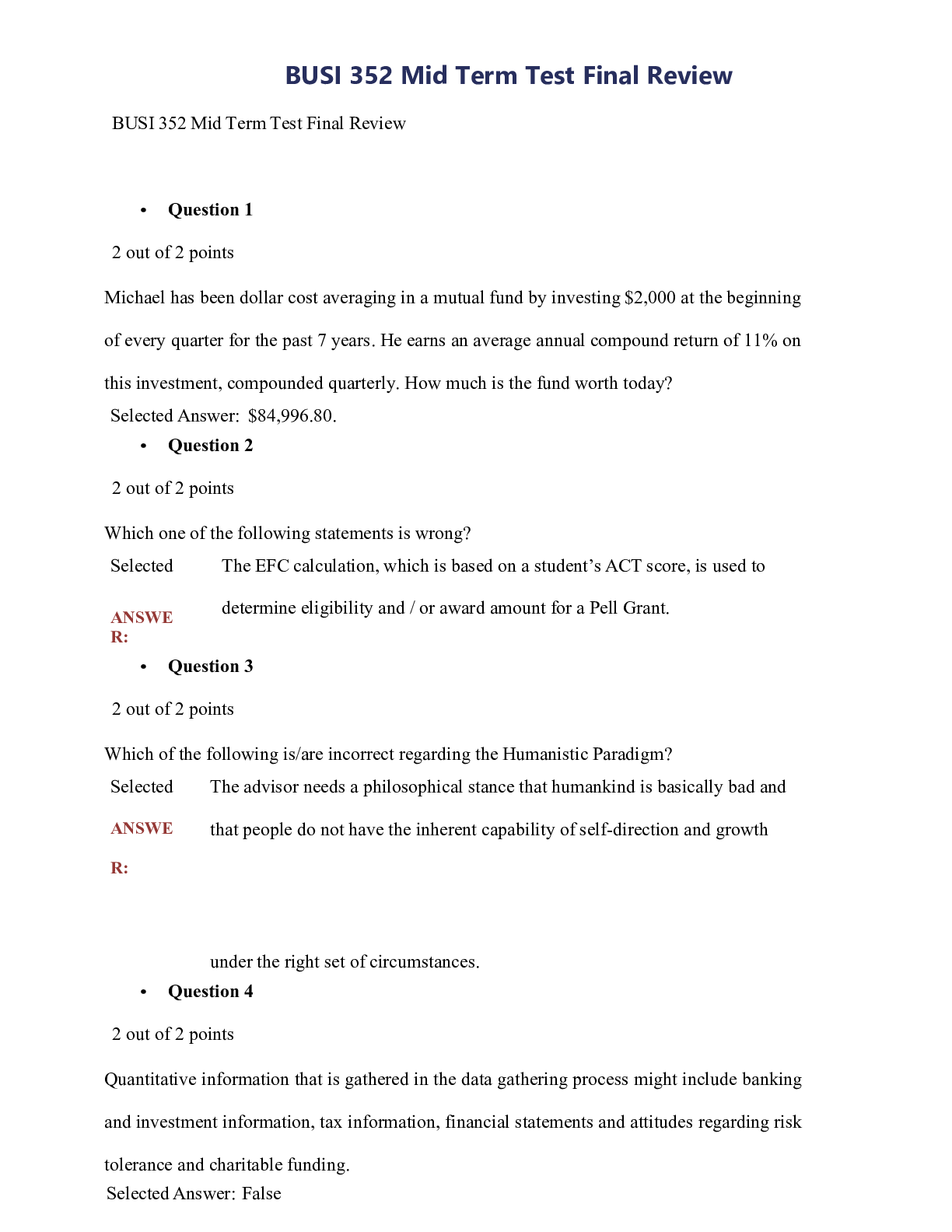
.png)

.png)

